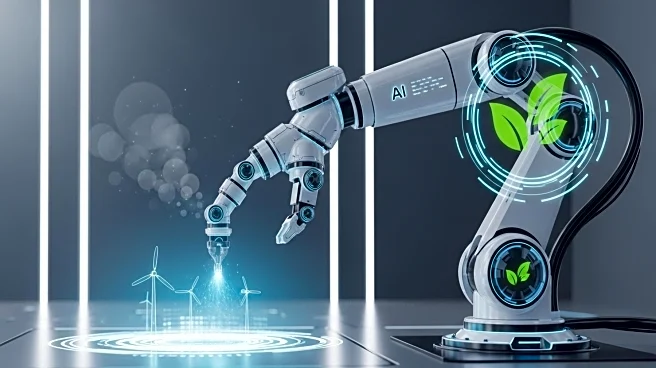What is the story about?
What's Happening?
The industrial sector is under pressure to decarbonize while maintaining growth and meeting energy demands. Accenture's Powered for Change 2025 report highlights the need for significant reductions in emissions across oil, gas, power, and heavy industries to achieve net-zero emissions by 2050. The report suggests a multigenerational approach to accelerate decarbonization through capital project builds. This strategy involves shifting from bespoke projects to repeatable systems that drive down costs and scale net-zero infrastructure. AI plays a crucial role in this approach by preserving institutional knowledge and ensuring sustained cost reductions. Despite the potential benefits, 90% of projects are currently delivered as bespoke efforts, with only 10% benefiting from repeatable teams or supply chains.
Why It's Important?
The adoption of a multigenerational, AI-powered approach to decarbonization is significant for the industrial sector as it promises substantial financial benefits. Early movers can unlock billions in value through scaled low-carbon infrastructure, with cost savings potentially reaching 35% by 2035. This approach could lead to price parity with gray hydrogen by 2037, six years earlier than traditional methods. The strategy also offers a competitive advantage by driving industrial transformation and securing cost efficiencies. The financial upside of scaling clean energy across heavy industry is considerable, with potential to generate over $60 billion in net present value by 2050.
What's Next?
The journey to industrial decarbonization involves several key steps. Companies need to build resilient supply chains, foster community support, reinvent talent and workflows, and establish a strong digital core to power AI learnings. These steps are essential to combat supply chain volatility, engage stakeholders, and adapt workforce skills for low-carbon operations. The integration of AI with a strong digital core will enable automated decision-making and predictive insights, facilitating the transition to net-zero infrastructure. The defining challenge for the next 25 years will be executing this strategy to achieve a self-sustaining and economically viable transformation.
Beyond the Headlines
The shift to a multigenerational approach in industrial decarbonization has deeper implications. It requires a cultural change within organizations, moving from top-down decision-making to empowering local teams with real-time authority. This approach also emphasizes the importance of community engagement and personalized communication strategies to build demand-side momentum. The transition to low-carbon infrastructure necessitates new skills and decision-making structures, highlighting the need for cross-functional learning and centralized knowledge hubs. The integration of AI in this process not only drives efficiencies but also ensures responsible and beneficial outcomes through robust governance frameworks.















